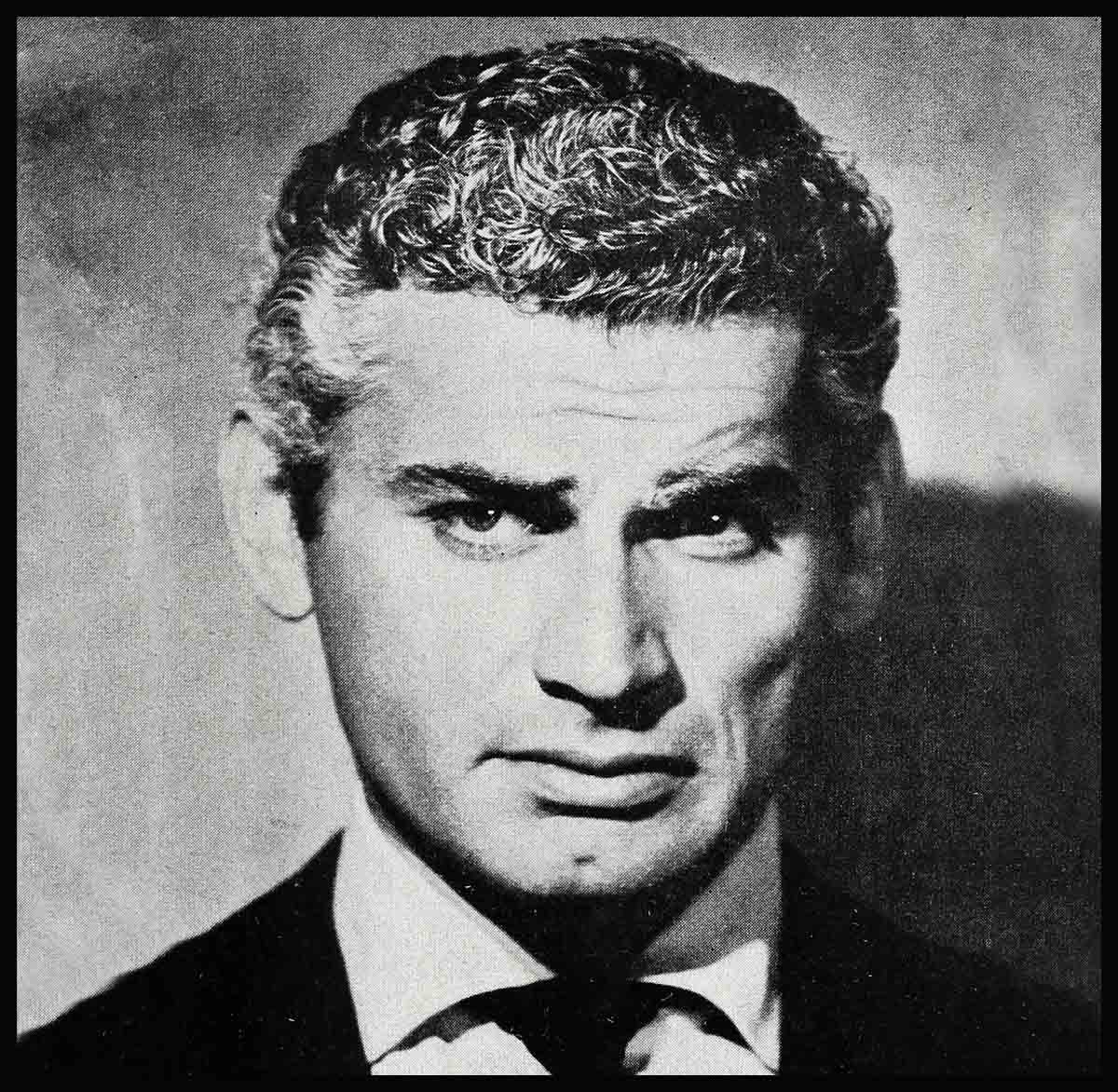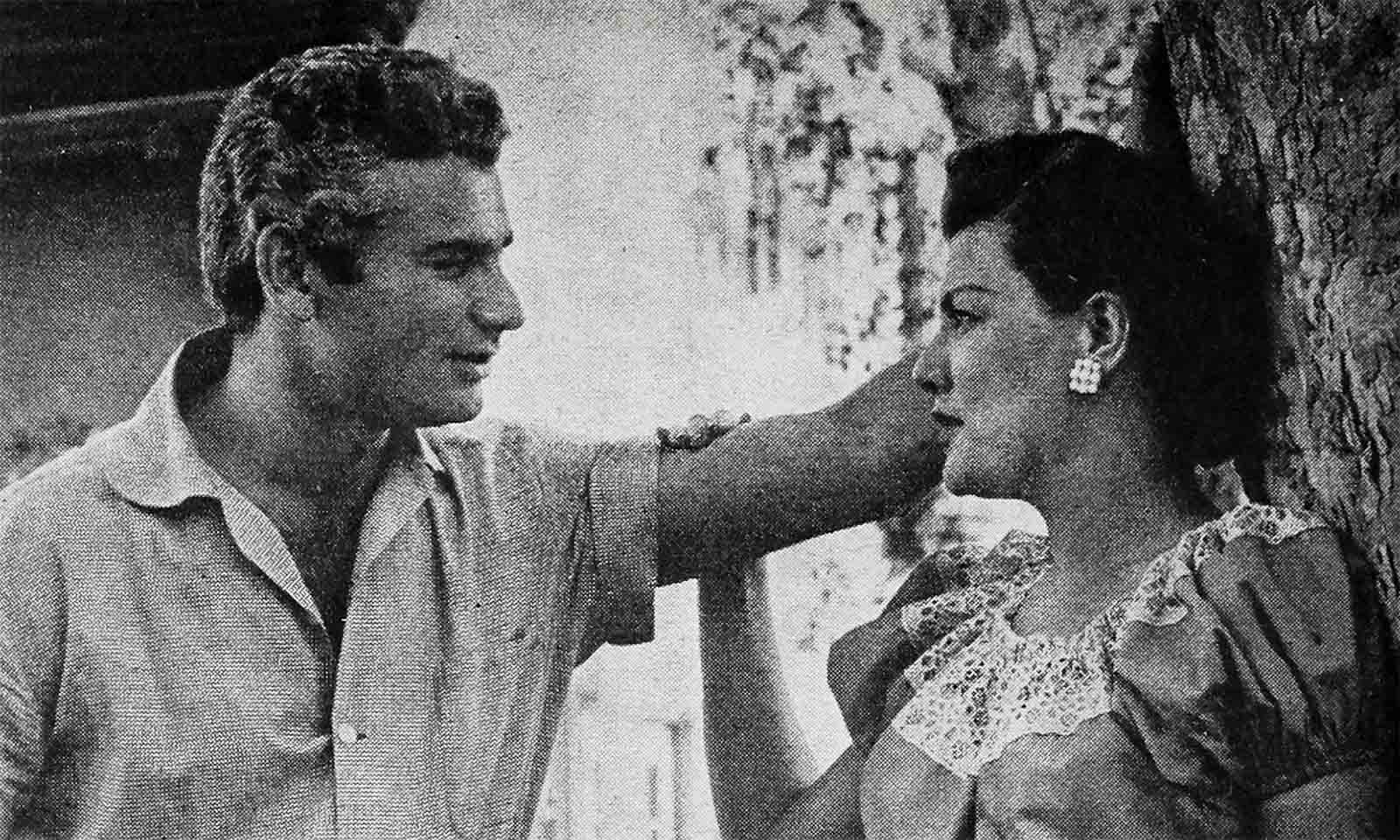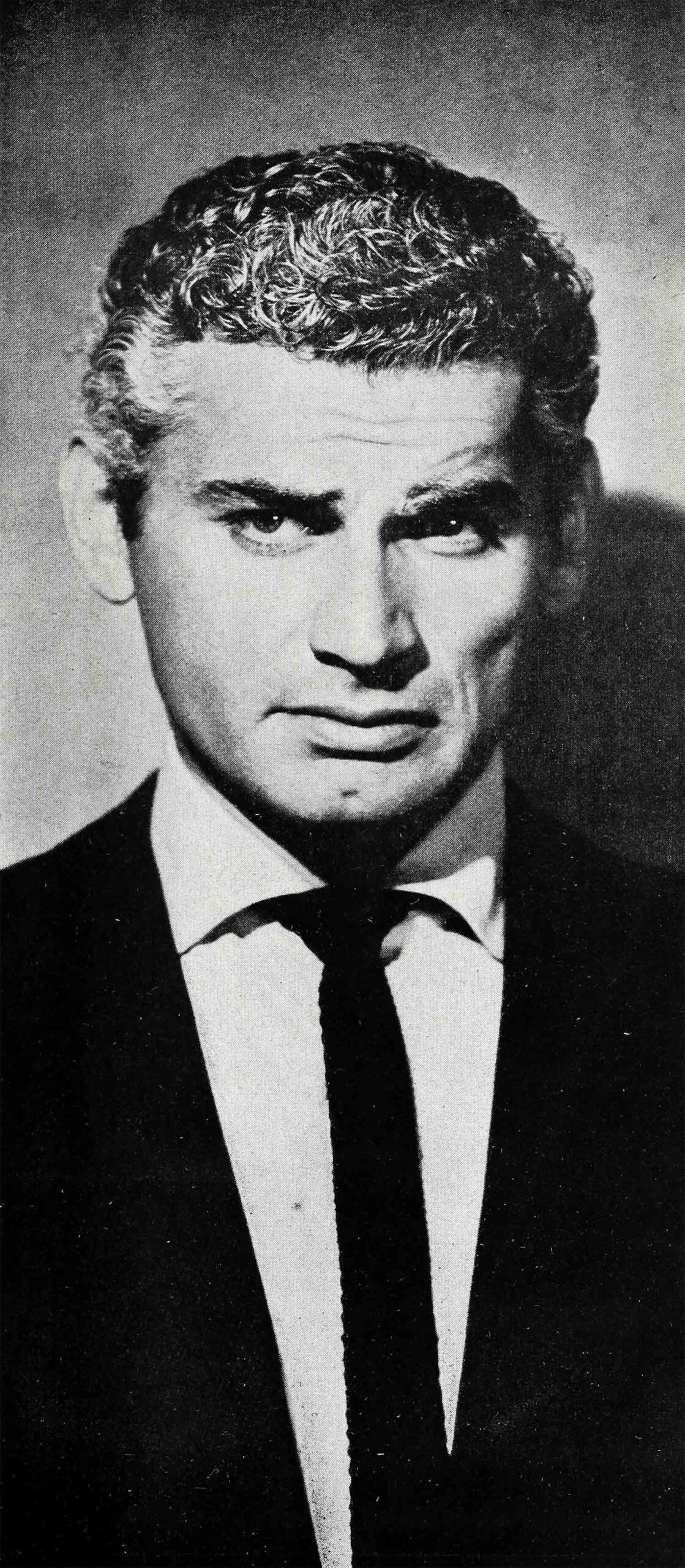
When Love Is Just a Memory—Jeff Chandler
They’re apart, Jeff and Marge Chandler, in spite of repeated tries to stay together. But together theirs is no longer an enchanted evening. Regardless of what you may have read, and may continue to read. this is the end of the story for two fine people who loved so much they were married twice, just to be sure they belonged to each other.
On a quiet palm-lined street in Hollywood in a Colonial house there’s the lovely redhead named Marge. And across the city, on Wilshire Boulevard in a furnished apartment—furnished yet bare—there lives an often lonely guy named Jeff.
They’ve missed happiness. the Jeff Chandlers, by so little. And now there’s time—too much—for each to ponder how and where and why and when their marriage reached this point of no return.
“There’s nobody else,” Jeff says, his voice heavy and slow. “Not for me. And I feel sure there’s nobody else for Marge. Certainly she gave no indication. This isn’t what I want. It isn’t what Marge has wanted. But it just seems there’s no other way for us.
“I’m terribly sad it hasn’t worked out. We’ve known great happiness. But we’re just one of those couples who’ve never quite made it on the long pull. You can call ours a near-miss.”
And he echoes in a sense what Marge had said. “We could have had so much. But I think this is better for both of us. It’s the only sensible thing to do—the only solution.”
As for any chance of a reconciliation, “I don’t see how,” Marge says.
“I doubt it,” says Jeff, adding, “Yet I don’t know. That’s a hard thing to say. It’s a little like saying no more babies will be born in the world. It can happen. But I doubt it very much—”
According to plan, Marge may soon be filing suit for separate maintenance. There is no reason, they both insist, to rush into getting a divorce. They say it matter-of-factly, yet as if each hesitated to break the tie irrevocably. Still, they are agreed, and have been agreed for some time, that there is no other way.
For contrary to news accounts, theirs was no sudden decision. “The last six months have indicated we can’t find happiness together,” Jeff states. “With an irregular relationship like ours—when you are happy one week and so unhappy the next—you know something is wrong. We would have announced it sooner, but I couldn’t find an apartment that was suitable.”
To both of them it’s all the more lamentable that what seems to be the final chapter of the Chandler marriage should have been written—and erroneously so—as a coast-to-coast marital drama of great confusion, with Jeff pictured as the master of a hideaway apartment and Marge as the outraged little woman locking the home doors.
“Marge knew about the apartment. But since I was leaving immediately for personal appearances in the East with ‘The Great Sioux Uprising,’ we decided to wait until I returned before making the official announcement. I didn’t want Marge to have to take the barrage of questions or satisfy the curiosity of those who would descend upon her alone. I wanted to be on hand too,” Jeff says.
Nobody deplores more than they do that the story leaked out prematurely and that so many inaccuracies resulted. “Somebody reported Marge as ‘hysterically’ trying to get the studio to announce our separation. This was sheer fiction. Marge did nothing like that,” he says. And she is equally emphatic. “We were so unhappy about the way the whole thing was handled. I knew about Jeff’s apartment. I wanted him to get it. But they made it sound as though he’d done something wrong, and as though I were spurning him.”

Those long accustomed to making headlines out of heart-lines would find the real reason behind the final separation more colorless. A reason as old-fashioned and as new, as simple and as sadly complicated as Marge’s definition. “I suppose it just comes under the heading of ‘incompatibility.’ ” And as Jeff says now, heavy-voiced, a memory between every word, “We’ve known great happiness. We have so much in common still—in so many things. But we just can’t live together.
“It reminds me of a story I’ve told many times,” Jeff adds, “but I never thought it would come home to roost. The story of a Roman Senator who was married to the most beautiful and alluring woman in the land. He was the envy of all the other Senators, and he and his wife were the picture of marital happiness. They’d been married ten years, when one day he left home. The other Senators couldn’t believe it, and they gathered around him. How could any man leave one so fair? Finally the Senator took off one of his sandals and passed it among them, saying, ‘Look at this, gentlemen. Tell me, what do you see?’ One admired the exquisite workmanship. Another the luxurious fabric, another the rich coloring. Then the Senator said, ‘All of you are right, my friends—but none of you can tell me where the shoe pinches . . .’
“Marge would have to say where the shoe pinches,” Jeff sums it up.
For one thing there had been too many ghosts from past misunderstandings and from their previous seven-month-separation. “A lot of bad things that had happened kept being remembered. They were never forgotten really—they were just there in the back of the mind in reserve.”
But there were many happy memories too. Where had the shoe pinched too hard for a marriage to wear? What had happened to those two attractive magnetic young people who’d met when she was under contract to Warner Brothers and he was with a small stock company? Those two who’d laughed together during tougher days when work was impossible to get in Hollywood. Then she was free-lancing and living on her unemployment insurance, and he was pounding the Hollywood beat of networks and agency offices—too proud to live on his. He finally connected in radio and they were married in a friend’s home by candlelight, as she’d always wanted to be, and they spent their honeymoon night in a motel on Ventura Boulevard. They shared so many hilarious happenings in that first apartment with the disappearing bed in the wall, the forbidden hot plate, the dishwashing in the bathroom basin.
What had happened to these two who were remarried by a Justice of Peace in the City Hall in Glendale on their first wedding anniversary, just to be sure the whole happy experience together was true? And whose three years’ equity in their dream lot is finally to be sub-divided . . . when they’re at long last financially able to build that long-awaited first home?
But as Jeff says, discounting any of the rumors that success had played the heavy in their break-up, “How can you go back five years ago when you were a radio actor and say what would have happened if you hadn’t gotten lucky? Or know whether the situation would have been changed? Whether you would have made a success of marriage, or been any happier? You can’t go back. It could be that as my career has developed, I’ve given too much time and energy to it, with, in turn, less time for my duties as a husband and father. I don’t know. But—this is me. I can’t do a job any other way.”
He welcomes his work doubly now. His career is soaring on, with “Foxfire,” with June Allyson, scheduled immediately following his present production, “Yankee Pasha.” And currently he’s in “East of Sumatra.”
With his serious application, his sense of responsibility for the success of a picture, and in a sense, for the jobs of all the many others connected with making it, stardom would be a heavy crown for Chandler. And it may have taken its toll. But as he says, that’s Jeff. He couldn’t work any other way.
Certainly there’s no truth in the old tired rumors that friction has developed from his objecting to Marge having a career.

That Jeff has ever stood in her way regarding a career, Marge has denied too, saying only recently, “Those rumors have always made us a little indignant. He would have been delighted. But having a husband and home and two children—that’s a career in itself. This has never been an issue between us.”
It could be, Jeff feels, that his own heavy seriousness about his career may have indirectly influenced some of their past misunderstandings. “Maybe I’ve over-extended my drive, with the result that I’ve tied myself up inside and haven’t given as much as I might in some instances. Maybe this is where I’ve ‘pinched’ a little bit.
“Each of us is entitled to enjoy life. And Marge and I want happiness as much as anybody else. If we can’t work it out together—then it’s got to be apart. While this doesn’t seem like the answer, it must be.”
And in the same vein, Marge has reasoned, “If two people won’t compromise on those things “am mean their happiness, if they can’t get past the impasse stage and they’re both unhappy—there’s nothing to do but separate.
“Part of our basic trouble, I believe, is from our own different psychological needs. My deep insecurity from childhood has been from a lack of love. I was never hungry or poor. But coming from a divided and very unhappy home, spending so much time in boarding school, I had a deep need for love. On the other hand, Jeff always had love, but he knew poverty.
“Perhaps—if we hadn’t known such great happiness together at first, we wouldn’t recognize there’s too little now. We’re not casual people, either of us. We just can’t settle for so much less than our marriage was once—and than we feel it should be.”
Their joint concern in arriving at a solution has been how it would affect the happiness of their two daughters, Jamie, so serious and warmly affectionate, and happy-go-lucky Dana, aged three.
“As ‘Hollywood’ as this sounds, we are still good friends. And we will always work out together what’s for the best interests of our children,” Marge says.
But for Jeff as well as for Marge, this comes close to home and to memories out of the past . . .
There is the memory of a kid named Ira Grossel, of Flatbush, whose parents separated when he was three years old, ard who was raised by his grandparents while his mother worked. He was always worried whether his mother would try to supply him with another father. When finally she remarried years later, Jeff asked her curiously, “Why didn’t you marry before?” And his mother had an answer. “Because you said you didn’t want me to. You said, ‘Don’t you ever find me another daddy—or I’ll run away. Jeff grimaced then, ‘Why would you pay any attention to a kid?’
Now he knows.
“This is one of the unfortunate things about a broken marriage,” he says. “Although actually this isn’t the greatest misfortune in the world. A lot of kids have grown up out of broken homes.
“We’ll go on with the children as we have. They won’t lose either of us. We’ll both belong to them, and they’ll belong to both of us. Better still, they’ll belong to themselves. That’s the important thing. I believe it’s better for them this way than it would be growing up in a tense, unhappy atmosphere. That would really destroy their confidence and give them insecurity.
“Of course nothing bothers our youngest, Dana. She just goes along in her merry way. But Jamie’s more dramatic at this point,” says her dad, worrying aloud.
It was Jamie who’d asked, her blue eyes anxious, her small face worried, “Why aren’t you going to live at home, Daddy?” Giving the most difficult answer ever asked of him, Jeff had said soothingly, “Because it’s just better for Mommy and Daddy to live apart for awhile, Baby.
“This wasn’t any answer, but what can you say?” Jeff asks. “There’s nothing you can explain too well to a six-year-old. You can’t tell her in an adult way why you’re not coming home.”
Nor can a man always tell why, himself.
Divorce?
“No, we have no plans for divorce—not for the time being anyway,” Jeff says. “The future? I don’t have a thing planned for that either. I’m just settling down to the apartment. We’re talking about things which must be talked about. Making any changes which must be made. I have no desire for a divorce. Whether this is wise or not—I don’t know.”
When a lovely thing dies . . . perhaps it would be wise to leave it there . . . taking only the happier memories.
THE END
It is a quote. PHOTOPLAY MAGAZINE NOVEMBER 1953




